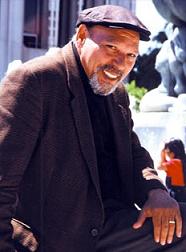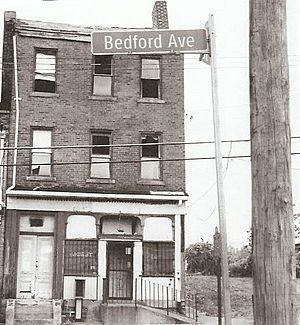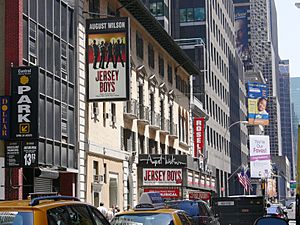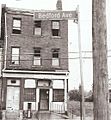August Wilson facts for kids
Quick facts for kids
August Wilson
|
|
|---|---|
 |
|
| Born | Frederick August Kittel Jr. April 27, 1945 Pittsburgh, Pennsylvania, U.S. |
| Died | October 2, 2005 (aged 60) Seattle, Washington, U.S. |
| Resting place | Greenwood Cemetery (Pittsburgh) |
| Occupation | Author, playwright |
| Notable awards | Pulitzer Prize for Drama (1987, 1990) Whiting Award (1986) Heinz Award in the Arts and Humanities (2004) |
| Spouse |
Brenda Burton
(m. 1969; div. 1972)Judy Oliver
(m. 1981; div. 1990)Constanza Romero
(m. 1994) |
| Children | 2 |
August Wilson (born Frederick August Kittel Jr.; April 27, 1945 – October 2, 2005) was a famous American playwright. He is known as "the theater's poet of Black America."
Wilson is best known for his series of ten plays called The Pittsburgh Cycle (or The Century Cycle). These plays tell stories about the lives and history of the African-American community throughout the 20th century. Some of his most famous plays include Fences (1987) and The Piano Lesson (1990). Both of these plays won the Pulitzer Prize for Drama, a very important award for writers. Other well-known plays are Ma Rainey's Black Bottom (1984) and Joe Turner's Come and Gone (1988).
Wilson's plays explore the experiences of African Americans. They also look at bigger ideas about what it means to be human. He wrote about issues like unfair treatment, race relations, identity, and moving to new places. Actress Viola Davis said that Wilson's writing "captures our humor, our vulnerabilities, our tragedies, our trauma. And he humanizes us."
After Wilson passed away, two of his plays were made into movies: Fences (2016) and Ma Rainey's Black Bottom (2020). Actor and director Denzel Washington has worked to bring these plays to the screen. He plans to adapt the rest of Wilson's plays into films so more people can see them.
Contents
Early Life and Education
August Wilson was born Frederick August Kittel Jr. in the Hill District of Pittsburgh, Pennsylvania. He was the fourth of six children. His father, Frederick August Kittel Sr., was a German immigrant who worked as a baker. His mother, Daisy Wilson, was an African-American woman from North Carolina who cleaned homes. Wilson's mother raised the children mostly by herself. His father was not often around. Wilson later chose to use his mother's last name, Wilson.
The neighborhood where he grew up was home to many Black Americans, Jewish, and Italian immigrants. Life was challenging for the Kittel children because they were biracial. August found it hard to feel like he belonged to one specific culture. He didn't feel fully part of either African-American or White culture until he was older.
In the 1950s, Wilson's mother divorced his father and married David Bedford. The family moved from the Hill District to Hazelwood, a mostly White neighborhood. Here, they faced racial hostility, and bricks were even thrown through their window. They soon had to move again.
The Hill District became the setting for many of Wilson's plays in The Pittsburgh Cycle. His experiences growing up there, especially with his strong mother, greatly influenced his writing.
Wilson attended Central Catholic High School for one year but dropped out. He then went to Connelley Vocational High School, but he found the classes boring. In 1960, he left Gladstone High School in the 10th grade. This happened after a teacher accused him of copying a long paper he wrote about Napoleon I. Wilson kept this decision a secret from his mother because he didn't want to upset her.
At 16, he started working odd jobs. He met many different people who later inspired characters in his plays. Wilson learned a lot by reading books at the Carnegie Library of Pittsburgh. He said he learned to read at age four. From age 12, he spent his teen years teaching himself by reading books by Black writers like Ralph Ellison and Langston Hughes. The library later gave him an honorary high school diploma.
Career as a Writer
Wilson knew he wanted to be a writer, but his mother wanted him to become a lawyer. This caused some tension. In 1962, he joined the United States Army for three years but left after one year. He then went back to working various jobs like a porter, cook, and dishwasher.
In 1965, after his father died, Frederick August Kittel Jr. changed his name to August Wilson to honor his mother. That same year, he discovered the blues music of Bessie Smith. He bought a stolen typewriter for $10, which he often had to pawn when he needed money. At 20, he decided he was a poet and started sending his work to magazines.
He loved to write in bars, cigar stores, and cafes. He would write longhand on napkins and yellow notepads, listening to the people around him. He felt writing on napkins made him less worried about being perfect. Later, he would type up his notes at home. Wilson had an amazing memory for how people spoke, including their accents and dialects. He used this talent in his plays.
The ideas of Malcolm X and the Black Power movement influenced Wilson's life and work. These movements taught about self-reliance and self-determination. In 1969, Wilson married Brenda Burton, who was Muslim. They had one daughter, Sakina Ansari-Wilson. They divorced in 1972.
In 1968, Wilson and his friend Rob Penny started the Black Horizon Theater in Pittsburgh's Hill District. Wilson's first play, Recycling, was performed for small audiences in schools and community centers. Tickets cost 50 cents. One of these early plays was Jitney, which he later rewrote as part of his 10-play cycle. Wilson had no directing experience at first. He once said, "I went to look for a book on how to direct a play. I found one called The Fundamentals of Play Directing and checked it out."
Moving and Writing
In 1978, Wilson moved to Saint Paul, Minnesota, after his friend, director Claude Purdy, suggested it. He got a job writing educational scripts for the Science Museum of Minnesota. In 1980, he received a fellowship for The Playwrights' Center in Minneapolis. He left the museum in 1981 but kept writing plays. He also worked part-time as a cook. Wilson worked closely with the Penumbra Theatre Company in St. Paul, which premiered some of his plays.
During the 1980s, Wilson wrote most of his famous works. These include Jitney (1982), Ma Rainey's Black Bottom (1984), Fences (1985), Joe Turner's Come and Gone (1986), and The Piano Lesson (1987). In 1987, the mayor of St. Paul, George Latimer, declared May 27 "August Wilson Day." This was because Wilson was the only person from Minnesota to win a Pulitzer Prize for Drama.
In 1990, Wilson moved to Seattle after getting divorced. He worked with the Seattle Repertory Theatre, which produced all ten plays of his cycle. They also produced his one-man show, How I Learned What I Learned.
When a Hollywood studio wanted to make his play Fences into a movie, Wilson insisted that a Black director be hired. He believed that a director should understand the culture of Black Americans. The film was not made until 2016, when Denzel Washington directed it. The movie Fences starred Washington and Viola Davis. Wilson received an Oscar nomination for it after his death.
Wilson received many honorary degrees from universities. He was a strong voice for Black theater. He believed in a theater where Black artists filled all roles. He also felt that Black actors should play roles specifically written for Black characters.
In 2005, Wilson's final play in his ten-part series, Radio Golf, opened. It was first performed in Connecticut and later on Broadway. This became known as Wilson's last work.
The Pittsburgh Cycle
Wilson's Pittsburgh Cycle, also called his Century Cycle, is a series of ten plays. Nine of these plays are set in Pittsburgh's Hill District. This neighborhood becomes a very important place in his stories. Each play is set in a different decade of the 20th century. They aim to show the Black experience and "raise awareness through theater." Wilson's plays often featured strong female characters, inspired by his mother. They also sometimes included elements of the supernatural.
For example, in The Piano Lesson, a piano is used to bring out the spirits of ancestors. Wilson wanted to create events in his plays that made the audience wonder what was real. He loved how theater could bring a community together to witness important events.
The plays in the cycle are not like a TV series, but some characters appear in more than one play at different ages. Children of characters from earlier plays might show up in later ones. The most often mentioned character is Aunt Ester, who is called a "washer of souls." She is said to be very old in Gem of the Ocean (285 years old) and Two Trains Running (349 years old). She dies in 1985 during the events of King Hedley II. The play Radio Golf is about plans to tear down her house. Aunt Ester is a symbolic figure who represents the long history of struggle and triumph for African Americans.
The plays also often feature a character who seems mentally impaired but offers wise advice. Examples include Hedley Sr. in Seven Guitars and Gabriel in Fences.
| Year | Title | Decade | Opened on Broadway |
|---|---|---|---|
| 1982 | Jitney | 1970s | 2017 – Samuel J. Friedman Theatre |
| 1984 | Ma Rainey's Black Bottom | 1920s | 1984 – Cort Theatre |
| 1985 | Fences | 1950s | 1987 – 46th Street Theatre |
| 1986 | Joe Turner's Come and Gone | 1910s | 1988 – Ethel Barrymore |
| 1987 | The Piano Lesson | 1930s | 1990 – Walter Kerr |
| 1990 | Two Trains Running | 1960s | 1992 – Walter Kerr |
| 1995 | Seven Guitars | 1940s | 1996 – Walter Kerr |
| 1999 | King Hedley II | 1980s | 2001 – Virginia Theatre |
| 2003 | Gem of the Ocean | 1900s | 2004 – Walter Kerr |
| 2005 | Radio Golf | 1990s | 2007 – Cort Theatre |
Many theater companies have produced all ten plays of the cycle. Chicago's Goodman Theatre was the first to do so, from 1986 to 2007. The Pittsburgh Public Theater was the first in Pittsburgh to produce the entire cycle.
Two years before he died, August Wilson wrote and performed a one-man play called How I Learned What I Learned. This play explored his early days as a struggling writer in Pittsburgh's Hill District. It showed how the neighborhood and its people inspired his plays about the African-American experience.
Personal Life
August Wilson was married three times. His first marriage was to Brenda Burton from 1969 to 1972. They had one daughter, Sakina Ansari. In 1981, he married Judy Oliver, and they divorced in 1990. In 1994, he married his third wife, costume designer Constanza Romero. They had a daughter named Azula Carmen Wilson.
Death
Wilson was diagnosed with liver cancer in June 2005. He passed away on October 2, 2005, in Seattle, at the age of 60. He was buried in Greenwood Cemetery, Pittsburgh. A memorial service was held at the University of Pittsburgh.
Work
| Year | Title | Notes |
|---|---|---|
| 1973 | Recycle | |
| 1977 | Black Bart and the Sacred Hills | |
| 1980 | Fullerton Street | |
| 1982 | Jitney | |
| 1984 | Ma Rainey's Black Bottom | |
| 1984 | Joe Turner's Come and Gone | |
| 1985 | Janitor | |
| 1986 | The Ground on Which I Stand [speech] | |
| 1987 | Fences | |
| 1989 | The Homecoming | |
| 1989 | The Coldest Day of the Year | |
| 1990 | The Piano Lesson | |
| 1991 | Two Trains Running | |
| 1995 | Seven Guitars | |
| 1999 | King Hedley II | |
| 2002 | How I Learned What I Learned | |
| 2003 | Gem of the Ocean | |
| 2005 | Radio Golf |
Awards and Honors
August Wilson received many important awards for his plays:
- Pulitzer Prize for Drama: He won this award twice, for Fences (1987) and The Piano Lesson (1990).
- Tony Award: He won a Tony Award for Best Play for Fences in 1987. His play Jitney won a Tony Award for Best Revival of a Play in 2017.
- Whiting Award (1986)
- Heinz Award in the Arts and Humanities (2004)
- American Theater Hall of Fame: He was inducted in 2006.
- National Humanities Medal (1999)
He also received many other honors, including:
- New York Drama Critics' Circle Award for Best American Play for Ma Rainey's Black Bottom (1985), Joe Turner's Come and Gone (1988), The Piano Lesson (1990), Seven Guitars (1996), and Jitney (2000).
- In 2021, the United States Postal Service honored Wilson with a Forever stamp as part of the Black Heritage series.
Legacy
Wilson's childhood home at 1727 Bedford Avenue in Pittsburgh is now a historic landmark. It was added to the National Register of Historic Places in 2013.
In Pittsburgh, there is an August Wilson Center for African American Culture. It has an exhibition about Wilson's life in the Hill District.
On October 16, 2005, shortly after Wilson's death, the Virginia Theatre on Broadway in New York City was renamed the August Wilson Theatre. It was the first Broadway theater to be named after an African-American person.
In Seattle, Washington, a street near the Seattle Repertory Theatre was renamed August Wilson Way. In 2016, a park near his childhood home was renovated and renamed August Wilson Park.
The University Library System at the University of Pittsburgh now holds Wilson's literary papers and materials in the August Wilson Archive.
Images for kids
See also
 In Spanish: August Wilson para niños
In Spanish: August Wilson para niños
 | Aurelia Browder |
 | Nannie Helen Burroughs |
 | Michelle Alexander |





